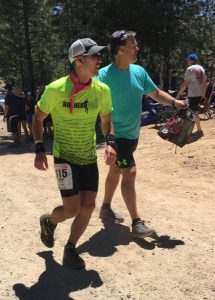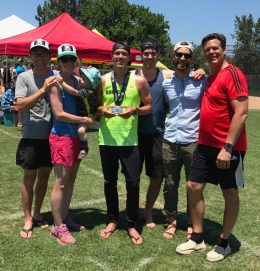
Teddy Bross, left, an ultramarathon runner and Boonshoft School of Medicine student, with his father at the Dusty Corners Aid Station, mile 38 of the 2017 Western States Endurance Run. (Photo by Chad Wolf)
Teddy Bross, a fourth-year medical student at the Wright State University Boonshoft School of Medicine, is an ultramarathon runner. He has officially competed in six of the 100-mile races, finishing his first in 2013.
Most recently, Bross was one of 250 runners selected to compete in the 2017 Western States 100 Endurance Run. More than 4,000 people entered a lottery to be chosen for the competition held in California’s Sierra Nevada. Bross, who applied four times for an opportunity to compete, completed the ultramarathon with a time of 23:07:13. He was one of a small group of runners who crossed the finish line under the 24-hour mark.
Though he’s found success in the sport, and qualifies at the elite level, Bross still finds himself struggling to determine why he does it. The races, which can take more than 24 hours to complete, are tough on his body. They’re extreme even for those who run marathons, which are typically a little more than 26 miles. For the non-running population, ultramarathons sound insane.
“The why is a tough question, and one I have been called to answer so many times in my own mind. I certainly love the challenge,” said Bross, who is from Cincinnati. “I find ultrarunning is a sport of endless freedom. I train on trails, running for hours among more miles of forest than most people will see in their lifetimes. This stress release takes me away from the pressures of grades, patients and peers, where I can think about nothing at all or everything at once.”
The regimented training and preparation before each race can be intense, and Bross does his best to prepare for everything. On race day, he packs extra gear, shoes and snacks. The unexpected still happens, and he has learned to accept it, adapt and keep moving.
“You cannot fake a 100-mile run. It takes preparation and it takes guts, and you run it with every little bit of everything inside you,” Bross said. “Everyone who crosses the finish line puts forth more physical effort than they can handle and are mentally broken on multiple occasions. I have yet to experience anything as intense as those late miles.”
Bross enjoys training and says most of his races are pure bliss. Still, they are full of challenges and can be painful. He ran through temperatures as high as 120 degrees Fahrenheit during the Western States 100 Endurance Run. It took runners through 18,000 feet of elevation, sloping trails and snow, from California’s Squaw Valley to Auburn.

Teddy Bross received a Silver Finishers Buckle following the 2017 Western States Endurance Run. (Photo by Ted Bross Jr.)
The last 20 miles of the race included other obstacles as Bross suffered severe nausea and vomiting. Members of his family ran the final stretch with him, offering encouragement to help him finish. Though there were other runners to compete against, Bross’ stellar time was the result of his family’s support, as well as internal struggle.
“I have learned just as much about people from running as I have from medicine, and that includes me. I know my innermost thoughts because of ultrarunning and I am comfortable with those voices of discord as well as empowerment,” Bross said. “Succeeding in an ultramarathon revolves around knowing your limits and humbly crossing into the unknown, often retreating back into your comfort zone.”
He’s found parallels between medicine and ultramarathons. It’s important for physicians to know their limits to provide the best care for patients. The unknowns he encounters while racing are similar to new experiences in medical school. He also sees the races as a team effort, because of the support of friends and family, helping him to recognize the importance of relationships and motivation in reaching goals.
“Step by step, one foot in front of the other. There is no better way to train for a ‘lifestyle change’ conversation than an internal battle,” he said. “I like to find out how I react in those moments of seemingly inevitable failure. The emotions become very raw and fully exposed.”
Bross hopes to integrate the lessons he’s learned into the rest of his medical education. After graduation, he would like to transition into a family medicine residency. From there, a fellowship in sports medicine feels like a good fit.
“Family medicine best aligns with my desire to form relationships with my patients and involve myself in a community. I also have a great passion for integrating health into medicine, including exercise, nutrition and mental well-being,” he said. “I love motivating others toward a healthier lifestyle, which is a huge part of primary care.”
Wright State celebrates its 50th anniversary as an independent public university in 2017, culminating with a special Homecoming celebration Sept. 29 through Oct. 1.

 Walking through open doors
Walking through open doors  Adventures await
Adventures await  Wright State to expand nursing facilities to meet workforce needs and prepare more graduates for in-demand careers
Wright State to expand nursing facilities to meet workforce needs and prepare more graduates for in-demand careers  Wright State student-athletes make a lasting impact on local family with more to come
Wright State student-athletes make a lasting impact on local family with more to come  Wright State names Rajneesh Suri dean of Raj Soin College of Business
Wright State names Rajneesh Suri dean of Raj Soin College of Business 